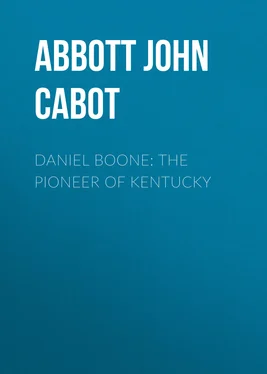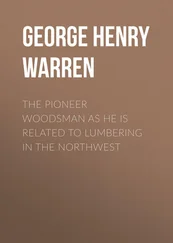John Abbott - Daniel Boone - The Pioneer of Kentucky
Здесь есть возможность читать онлайн «John Abbott - Daniel Boone - The Pioneer of Kentucky» — ознакомительный отрывок электронной книги совершенно бесплатно, а после прочтения отрывка купить полную версию. В некоторых случаях можно слушать аудио, скачать через торрент в формате fb2 и присутствует краткое содержание. Жанр: Путешествия и география, История, foreign_edu, foreign_antique, foreign_prose, на английском языке. Описание произведения, (предисловие) а так же отзывы посетителей доступны на портале библиотеки ЛибКат.
- Название:Daniel Boone: The Pioneer of Kentucky
- Автор:
- Жанр:
- Год:неизвестен
- ISBN:нет данных
- Рейтинг книги:3 / 5. Голосов: 1
-
Избранное:Добавить в избранное
- Отзывы:
-
Ваша оценка:
- 60
- 1
- 2
- 3
- 4
- 5
Daniel Boone: The Pioneer of Kentucky: краткое содержание, описание и аннотация
Предлагаем к чтению аннотацию, описание, краткое содержание или предисловие (зависит от того, что написал сам автор книги «Daniel Boone: The Pioneer of Kentucky»). Если вы не нашли необходимую информацию о книге — напишите в комментариях, мы постараемся отыскать её.
Daniel Boone: The Pioneer of Kentucky — читать онлайн ознакомительный отрывок
Ниже представлен текст книги, разбитый по страницам. Система сохранения места последней прочитанной страницы, позволяет с удобством читать онлайн бесплатно книгу «Daniel Boone: The Pioneer of Kentucky», без необходимости каждый раз заново искать на чём Вы остановились. Поставьте закладку, и сможете в любой момент перейти на страницу, на которой закончили чтение.
Интервал:
Закладка:
In 1756 a feeble attempt was made to establish a colony upon the Tennessee river, at a spot which was called London. This was one hundred and fifty miles in advance of any white settlement. Eight years passed, and by the ravages of war the little settlement went up in flame and smoke. As the years rapidly came and went there were occasional bursts of the tempests of war; again there would be a short lull and blessed peace would come with its prosperity and joy.
"In the year 1760, Doctor Walker again passed over Clinch and Powell's rivers on a tour of exploration, into what is now Kentucky. The Cherokees were then at peace with the whites, and hunters from the back settlements began, with safety, to penetrate deeper and further into the wilderness of Tennessee. Several of them, chiefly from Virginia, hearing of the abundance of game with which the woods were stocked, and allured by the prospect of gain which might be drawn from this source, formed themselves into a company composed of Wallen, Seagys, Blevins, Cox and fifteen others, and came into the valley, since known as Carter's Valley, in Hawkin's county, Tennessee. They hunted eighteen months upon Clinch and Powell rivers. Wallen's Creek and Wallen's Ridge received their name from the leader of the company; as also did Wallen's Station which they erected in the Lee county, Virginia.
"They penetrated as far north as Laurel Mountain, in Kentucky, where they terminated their journey, having met with a body of Indians whom they supposed to be Shawnees. At the head of one of the companies that visited the West, this year, came Daniel Boone from the Yadkin, in North Carolina, and travelled with them as low as the place where Abingdon now stands, and there left them."
This is the first time the advent of Daniel Boone to the western wilds has been mentioned by historians or by the several biographers of that distinguished pioneer and hunter. There is reason however to believe that he hunted upon Watauga some time earlier than this.
CHAPTER II.
Daniel Boone, his Parentage, and early Adventures
Trials of the Colonists.—George Boone and his home.—Squire Boone.—Birth and character of Daniel Boone.—His limited education.—A pioneer's camp.—A log house and furnishings.—Annoyance of Boone on the arrival of Scotch emigrants.—His longings for adventure.—Camp meetings.—Frontier life.—Sports.—Squirrel hunting.—Snuffing the candle.
It was but a narrow fringe upon the sea coast of North America, which was thus far occupied by the European emigrants. Even this edge of the continent was so vast in its extent, from the southern capes of Florida to the gulf of St. Lawrence, that these colonial settlements were far separated from each other. They constituted but little dots in the interminable forest: the surges of the Atlantic beating upon their eastern shores, and the majestic wilderness sweeping in its sublime solitude behind them on the west. Here the painted Indians pursued their game, while watching anxiously the encroachments of the pale faces. The cry of the panther, the growling of the bear, and the howling of the wolf, were music to the settlers compared with the war-hoop of the savage, which often startled the inmates of the lonely cabins, and consigned them to that sleep from which there is no earthly waking. The Indians were generally hostile, and being untutored savages, they were as merciless as demons in their revenge. The mind recoils from the contemplation of the tortures to which they often exposed their captives. And one cannot but wonder that the Almighty Father could have allowed such agony to be inflicted upon any of His creatures.
Notwithstanding the general desire of the colonial authorities to treat the Indians with justice and kindness, there were unprincipled adventurers crowding all the colonies, whose wickedness no laws could restrain. They robbed the Indians, insulted their families, and inflicted upon them outrages which goaded the poor savages to desperation. In their unintelligent vengeance they could make no distinction between the innocent and the guilty.
On the 10th of October, 1717, a vessel containing a number of emigrants arrived at Philadelphia, a small but flourishing settlement upon the banks of the Delaware. Among the passengers there was a man named George Boone, with his wife and eleven children, nine sons and two daughters. He had come from Exeter, England, and was lured to the New World by the cheapness of land. He had sufficient property to enable him to furnish all his sons with ample farms in America. The Delaware, above Philadelphia, was at that time a silent stream, flowing sublimely through the almost unbroken forest. Here and there, a bold settler had felled the trees, and in the clearing had reared his log hut, upon the river banks. Occasionally the birch canoe of an Indian hunter was seen passing rapidly from cove to cove, and occasionally a little cluster of Indian wigwams graced some picturesque and sunny exposure, for the Indians manifested much taste in the location of their villages.
George Boone ascended this solitary river about twenty miles above Philadelphia, where he purchased upon its banks an extensive territory, consisting of several hundred acres. It was near the present city of Bristol, in what is now called Buck's County. To this tract, sufficiently large for a township, he gave the name of Exeter, in memory of the home he had left in England. Here, aided by the strong arms of his boys, he reared a commodious log cabin. It must have been an attractive and a happy home. The climate was delightful, the soil fertile, supplying him, with but little culture, with an ample supply of corn, and the most nutritious vegetables. Before his door rolled the broad expanse of the Delaware, abounding with fish of delicious flavor. His boys with hook and line could at any time, in a few moments, supply the table with a nice repast. With the unerring rifle, they could always procure game in great variety and abundance.
The Indians, won by the humanity of William Penn, were friendly, and their occasional visits to the cabin contributed to the enjoyment of its inmates. On the whole a more favored lot in life could not well be imagined. There was unquestionably far more happiness in this log cabin of the settler, on the silent waters of the Delaware, than could be found in any of the castles or palaces of England, France, or Spain.
George Boone had one son on whom he conferred the singular name of Squire. His son married a young woman in the neighborhood by the name of Sarah Morgan, and surrounded by his brothers and sisters, he raised his humble home in the beautiful township which his father had purchased. Before leaving England the family, religiously inclined, had accepted the Episcopal form of Christian worship. But in the New World, far removed from the institutions of the Gospel, and allured by the noble character and influence of William Penn, they enrolled themselves in the Society of Friends. In the record of the monthly meetings of this society, we find it stated that George Boone was received to its communion on the thirty-first day of tenth month, in the year 1717. It is also recorded that his son Squire Boone was married to Sarah Morgan, on the twenty-third day of seventh month, 1720. The records of the meetings also show the number of their children, and the periods of their birth.
By this it appears that their son Daniel, the subject of this memoir, was born on the twenty-second day of eighth month, 1734. It seems that Squire Boone became involved in difficulties with the Society of Friends, for allowing one of his sons to marry out of meeting. He was therefore disowned, and perhaps on this account, he subsequently removed his residence to North Carolina, as we shall hereafter show. His son Daniel, from earliest childhood, developed a peculiar and remarkably interesting character. He was silent, thoughtful, of pensive temperament, yet far from gloomy, never elated, never depressed. He exhibited from his earliest years such an insensibility to danger, as to attract the attention of all who knew him. Though affectionate and genial in disposition, never morose or moody, he still loved solitude, and seemed never so happy as when entirely alone. His father remained in his home upon the Delaware until Daniel was about ten years of age.
Читать дальшеИнтервал:
Закладка:
Похожие книги на «Daniel Boone: The Pioneer of Kentucky»
Представляем Вашему вниманию похожие книги на «Daniel Boone: The Pioneer of Kentucky» списком для выбора. Мы отобрали схожую по названию и смыслу литературу в надежде предоставить читателям больше вариантов отыскать новые, интересные, ещё непрочитанные произведения.
Обсуждение, отзывы о книге «Daniel Boone: The Pioneer of Kentucky» и просто собственные мнения читателей. Оставьте ваши комментарии, напишите, что Вы думаете о произведении, его смысле или главных героях. Укажите что конкретно понравилось, а что нет, и почему Вы так считаете.












